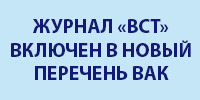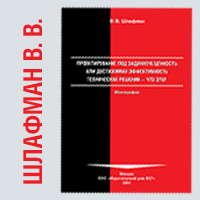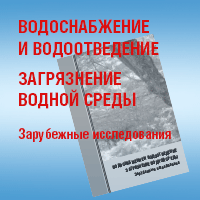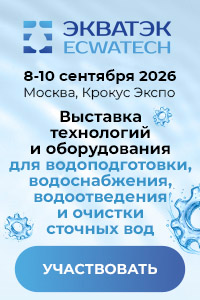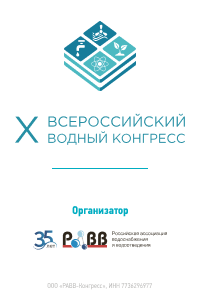№10|2013
WATER SOURCES QUALITY MONITORING
bbk 000000
UDC 628.16:504.064
Estimation of biological hazard of organic xenobiotics
in water supply sources
Summary
Identification of pollutants, estimation of their concentration in water and biological hazard are important practical tasks in the assessment of water quality in the Moscow drinking water sources. In estimating the pollution rate of a water body it is required to draw out a xenobiotics profile, i. e. the complex of bioactive species of all the xenobiotics present in water. Among xenobiotics the compounds of medical origin were defined alongside with compounds with pharmacological activity, however not used in medicine («quasidrugs»). The technique of determining biological activity profile with the help of a special search and design information system has been developed. The first part of the system is based on the Russian and international regulatory documents; lists of especially hazardous substances; guides on separate toxic substances; journals or data bases compiled by international and national organizations. The second part of the system is represented by the technique of prognosticating biological activity on the basis of analyzing its relationships with the chemical structure of a substance. This method has been implemented in PASS software with teaching selection containing the information on more than 250,000 pharmaceuticals and toxicants. Xenobiotic profile can be reflected on ecotoxicological maps. The results of studies give the start to sequential practical actions from compiling a xenobiotic profile of a project to developing efficient water treatment technologies that will provide for reducing the concentration of xenobiotics including ones with pharmacological activity to the maximum permissible level.
Key words
water supply source , organic xenobiotic , biological activity , substance toxicity
The further text is accessible on a paid subscription.
For authorisation enter the login/password.
Or subscribe
REFERENCES
- Gosudarstvennyi doklad «O sanitarno-epidemiologicheskoi obstanovke v Rossiiskoi Federatsii v 2010 godu» [Public report «On sanitation-and-epidemiologic situation in the Russian Federation in 2010»]. Moscow, Federal Centre for Hygiene and Epidemiology of Rospotrebnadzor, 2011, 431 p. (In Russian).
- US EPA home page http://www.epa.gov.
- Barenboim G. M., Malenkov A. G. Biologicheski aktivnye veshchestva. Novye printsipy poiska [Biologically active substances. Advance research principles]. Moscow, Nauka Publ., 1986, 364 p. (In Russian).
- Santos L., Araujo A., Fachini A., et al. Ecotoxicological aspects related to the presence of pharmaceuticals in the aquatic environment. Journal of Hazardous Materials, 2010, no. 175, pp. 45–95.
- Barenboim G. M., Chiganova M. A., Aksenov A. V. Otsenka biologicheskoi opasnosti organicheskikh ksenobiotikov [Estimation of biological hazard of organic xenobiotics]. Metody Otsenki Sootvetstviia, 2011, no. 7, pp. 28–33. (In Russian).
- Filimonov D. A., Poroikov V. V. Probabilistic approach in activity prediction. Chemoinformatics Approaches to Virtual Screening. Cambridge (UK), RSC Publ., 2008, рp. 182–216.
- Danilov-Danil’ian V. I., Khramenkov S. V., Poroikov V. V., Chiganova M. A., Kozlov M. N., Filimonov D. A., Barenboim G. M. Novye metody otsenki biologicheskoi aktivnosti ksenobiotikov v vodnykh ob”ektakh: Materialy konferentsii «Metody analiza i kontrolia kachestva vody» [Advanced methods of estimating the biological activity of xenobiotics in water bodies: Proceedings of «Methods of water quality analysis and monitoring» Conference]. Moscow, June 6, 2012, p. 5. (In Russian).
- Barenboim G., Saveka A., Chiganova M. New methods for assessing of ecological risk of individual hydrocarbons in emergency oil spills (in connection with the problem of environmental risk management). The «Experts Workshop» on Environmental Forensics. Tbilisi, Georgia, 12th–16th September 2011, pp. 157–163.
- Lagunin A., Zakharov A., Filimonov D., et al. QSAR modelling of rat acute toxicity on the basis of PASS prediction. Molecular Informatics, 2011, no. 30, pp. 241–250.


